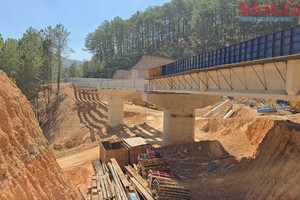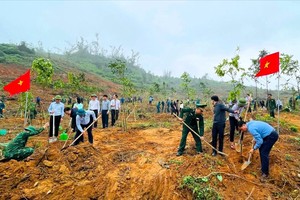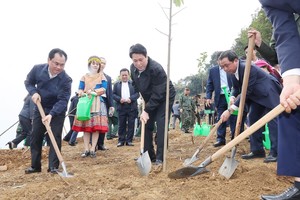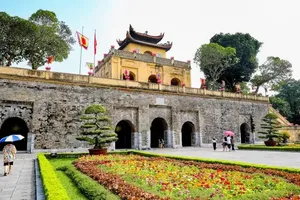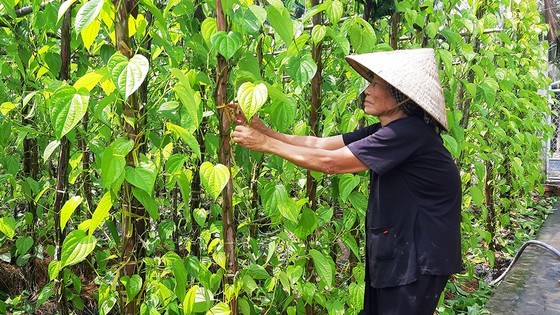
Vi Thuy village has been regarded as the biggest area for planting betel in the Mekong Delta region for years.
Traveling in a street in hamlet No. 5 in Vi Thuy village, verdant nonstop betel gardens spanning from houses to houses are easily seen from far.
In fact, planting betel involves many risks, especially its unexpected prices; however, devoting to this job can bring about considerable income in comparison to growing of other plants.
According to Dao Thi Quyen, a villager in Vi Thuy, cultivating betel is thought to be a means of recreation at first, but in reality, this job has helped many households to get over poverty and lead better lives. Taken her life as an example, thanks to accumulative profits from harvesting betel, she and her husband have managed to expand the area of cultivation.
Till now, they have bought an additional hectare of land and building solid brick house as well as raising 2 children who have graduated from universities, Mrs. Quyen said happily.
Similarly, 80-year-old villager Phan Thi Nam revealed that the money from bumper crops of betel has helped her to buy almost two more hectares of land and to rear her 4 children easily by growing betel and rice.
Talking about advantages of betel cultivation in the village, Vice Chairman of Vi Thuy Commune People’s Committee Nguyen Van Kinh said people can make use of vacant or abandoned areas of land in the house’s premises for planting betel to increase their income in leisure time. Because betel is harvested all year round, price just fluctuates VND 2,500 - 3,500 per pack ( or 40 leaves), and people can net VND100 million per 1,000 square meter a year, much higher than that of rice cultivation.
Thanks to its handsome profits, the betel area of cultivation in Vi Thuy commune has expanded to about 33 hectares with nearly 200 farming households, becoming the largest one in the Mekong Delta.
As assessed by the vice-chairman, growing betel is not only a way to earn a living but also helps preserve a traditional feature in Vietnamese culture as betel leaf has been used as an offering in wedding ceremonies. Plus, betel leaves (with betel nuts, gold, and silver papers) are used to make a New Year tree hung in front of the doors of houses in Vietnam to welcome New Year’s Eve. Besides, betel leaves also serve as a valuable kind of herbal medicine.
Director of Trau Vang Co-operative Nguyen Van Doi said that it is inevitable to avoid betel price fluctuations. However, this year tends to be the most drastic year due to prolonged heat and Covid-19 pandemic.
While watering the betel plants, Mrs. Nam revealed that the sweltering weather has taken its toll on residents in the southern region these days, she had to water pothos plants more often to prevent its leaves from drying, withering, or even dying.
For the time being, it is a daunting task to take good care of her crop, and betel-growers have to face sudden falling in betel price. Recently, due to difficulties in finding customers, betel price has dropped sharply from VND10,000- VND15,000 per pack in Tet holiday ( the Lunar New Year ) to VND 2,000 per pack. However, all agricultural products have suffered price drop, betel growers had to take it for granted and tried their best to overcome the adversity, Mrs. Nam spoke frankly.
Previously, betel is harvested once every 10 days to supply for traders who transport it to sell everywhere in the country and for export. In present difficult time, betel farmers have extended their harvesting time longer or pick up old, yellow leaves, and such accepting lower income in the current difficult period.
They hoped that when Covid-19 epidemic has cooled down, several business and production activities have gradually come into operation again, the consumption of betel will be better, said Mrs. Phan Thi Sang who has spent 30 years growing betel.
Presently, Vi Thuy betel commune has been recognized as a traditional village. What’s more? Trau Vang Cooperative has also been established to promote the image of the products and expand its markets, etc.
In the long term, the Department of Culture, Sports and Tourism of the Mekong Delta Province of Hau Giang together with specialized agencies under the Ministry of Culture, Sports and Tourism has surveyed the village to find out a plan for development of betel garden tourism.
Villagers are eager to participate in the tourism project to introduce local traditional betel gardens to visitors. This is also a way to preserve and develop the unique remaining betel village in the Mekong Delta, said Vice Chairman Nguyen Van Kinh.




